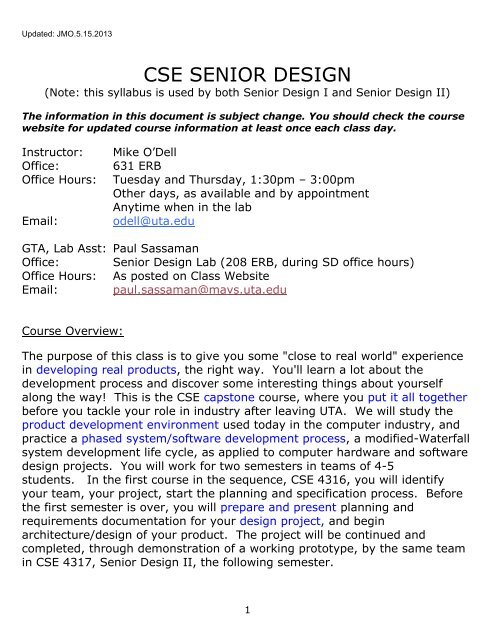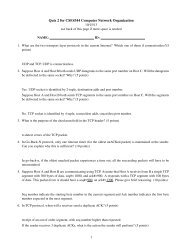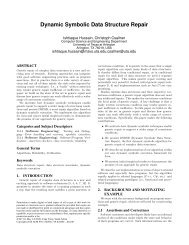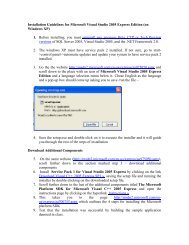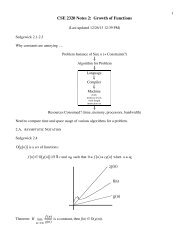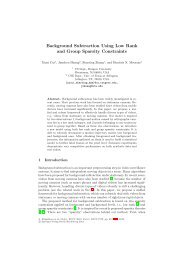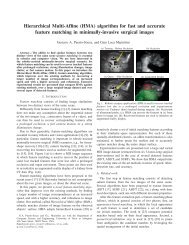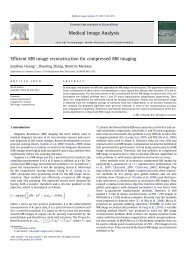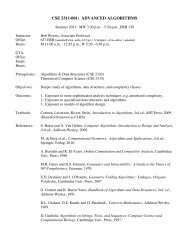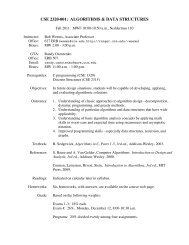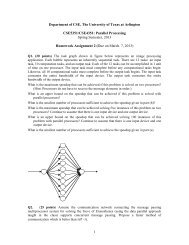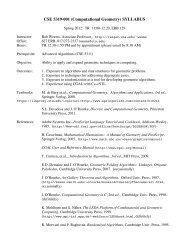Syllabus - cse services
Syllabus - cse services
Syllabus - cse services
Create successful ePaper yourself
Turn your PDF publications into a flip-book with our unique Google optimized e-Paper software.
Updated: JMO.5.15.2013<br />
CSE SENIOR DESIGN<br />
(Note: this syllabus is used by both Senior Design I and Senior Design II)<br />
The information in this document is subject change. You should check the course<br />
website for updated course information at least once each class day.<br />
Instructor:<br />
Office:<br />
Office Hours:<br />
Email:<br />
Mike O’Dell<br />
631 ERB<br />
Tuesday and Thursday, 1:30pm – 3:00pm<br />
Other days, as available and by appointment<br />
Anytime when in the lab<br />
odell@uta.edu<br />
GTA, Lab Asst: Paul Sassaman<br />
Office: Senior Design Lab (208 ERB, during SD office hours)<br />
Office Hours: As posted on Class Website<br />
Email: paul.sassaman@mavs.uta.edu<br />
Course Overview:<br />
The purpose of this class is to give you some "close to real world" experience<br />
in developing real products, the right way. You'll learn a lot about the<br />
development process and discover some interesting things about yourself<br />
along the way! This is the CSE capstone course, where you put it all together<br />
before you tackle your role in industry after leaving UTA. We will study the<br />
product development environment used today in the computer industry, and<br />
practice a phased system/software development process, a modified-Waterfall<br />
system development life cycle, as applied to computer hardware and software<br />
design projects. You will work for two semesters in teams of 4-5<br />
students. In the first course in the sequence, CSE 4316, you will identify<br />
your team, your project, start the planning and specification process. Before<br />
the first semester is over, you will prepare and present planning and<br />
requirements documentation for your design project, and begin<br />
architecture/design of your product. The project will be continued and<br />
completed, through demonstration of a working prototype, by the same team<br />
in CSE 4317, Senior Design II, the following semester.<br />
1
Updated: JMO.5.15.2013<br />
Text and Other Required Items<br />
Primary Text<br />
(Required)<br />
Rapid Development, by Steve McConnell. Available in the UTA<br />
bookstore or most online book vendors.<br />
Engineering<br />
Notebook<br />
(Required)<br />
Standard Engineering Notebook as printed by BookFactory of<br />
Redwood Shores, CA. This notebook is available in the UTA<br />
bookstore or directly from BookFactory.com<br />
Specific Course Outcomes/Objectives:<br />
At the conclusion of the course, comprising both CSE 4316 and CSE 4317, the student will<br />
have developed the necessary skills to work on a product design and development team<br />
by substantially completing a working prototype of a complete product. The skills required<br />
to do this include all of the technical skills that should have been assimilated thus far in the<br />
student's program of work, as well as soft skills that will be learned and/or honed during<br />
the project. The primary objective of this course is the final preparation of the student for<br />
entrance into the workplace with the ability to be productive almost immediately.<br />
Additionally, the student will have met the following specific ABET (Accrediting Board for<br />
Engineering and Technology) Critical Assessment outcomes:<br />
Ability to design a system, component, or process to meet desired needs<br />
This outcome will be evaluated based on your performance on the key deliverables<br />
for this course: system requirements document, architectural design specification,<br />
detailed design specification, system test plan, and your final product prototype.<br />
Ability to function on multi-disciplinary teams<br />
This outcome will be evaluated using peer evaluations and instructor assessments at<br />
the end of each semester.<br />
Other ABET outcomes that are very relevant to this class, although not specifically<br />
evaluated, are:<br />
2
Updated: JMO.5.15.2013<br />
(f) Understanding of professional and ethical responsibility<br />
(g) Ability to communicate effectively<br />
ABET Critical Assessments and their effect on grades:<br />
As indicated above, Senior Design is used to measure your performance against two of the<br />
ABET Outcomes for your particular program (CS, CpE or SwEng). The evaluation of your<br />
performance as measured against these outcomes is a simple Pass/Fail. Please note that<br />
you must achieve a Pass grade on each of the outcomes in each semester. If you fail, or do<br />
not complete, any individual outcome you will fail the course regardless of your<br />
performance in other areas. Additionally, several graded class exercises and/or<br />
assignments will be used to evaluate these outcomes. These assignments are scored as<br />
individual or team deliverables as discussed below and in class lecture notes.<br />
Topics Covered/Lectures<br />
For details of individual lectures and the accompanying slides, please see the appropriate<br />
Class Materials/Info page on the class web site.<br />
Prerequisites<br />
All students are responsible for mastery of the material taught in ALL prerequisite courses,<br />
including both those listed here and their prerequisites.<br />
CSE<br />
3310<br />
CSE<br />
3320<br />
CSE<br />
3442<br />
IE<br />
3312<br />
SPCH<br />
3302<br />
FUNDAMENTALS OF SOFTWARE ENGINEERING. Software engineering<br />
principles, processes, and techniques; software development approaches<br />
focusing on functional analysis and functional design methods. Configuration<br />
management, implementation strategies, and testing (co-requisite)<br />
OPERATING SYSTEMS. Functions and components of an operating system,<br />
including process synchronization, job scheduling, memory management, file<br />
systems protection, and deadlocks. Related system software, such as loaders,<br />
linkers, assemblers, and windowing systems.<br />
EMBEDDED COMPUTER SYSTEMS. Design of microcomputer based systems:<br />
microcomputer programming, component and system architectures, memory<br />
interfacing, parallel and serial I/O interfacing, A/D and D/A conversion, and<br />
typical applications. Required for CpE majors only.<br />
ECONOMICS FOR ENGINEERS. Methods used for determining the comparative<br />
financial desirability of engineering alternatives.<br />
PROFESSIONAL AND TECHNICAL COMMUNICATION. Theory and practice in<br />
written and oral presentations with an emphasis on business and technical<br />
professions.<br />
3
Updated: JMO.5.15.2013<br />
Class Website<br />
Access to all materials and general information for this class is via the instructor’s class<br />
website at: http://ranger.uta.edu/~odell.<br />
This website is the focal point for class information, notes and lecture materials. You should<br />
check this site daily for announcements, handouts, assignments, updated presentations,<br />
etc. Each student is responsible for the materials, assignments, due dates posted on this<br />
site.<br />
Handouts<br />
All handouts may be retrieved from the class website. You will need the PDF reader,<br />
Microsoft Office applications such as Word and PowerPoint, and selected other readily<br />
available applications for your system to make use of some of these files. Readers are<br />
available for all common operating systems and environments. You are responsible for the<br />
information in these files.<br />
Class Preparation<br />
This class is interaction intensive, meaning that you are expected to participate in class<br />
discussion and contribute to the learning experience. Each student is responsible for<br />
carefully reviewing all specified lecture/discussion material before each class session and<br />
being prepared for class discussion. The majority of readings are from the course textbook.<br />
Additional reading may be assigned and class handouts may be distributed, typically via the<br />
website, to supplement text readings. Presentation materials to be used for discussion of<br />
each topic in class are provided on the class website. Students will receive a grade on their<br />
participation in classroom discussions as indicated below. Topics for classroom discussions<br />
each week are as indicated on the class website, and will be updated as necessary<br />
throughout the semester. Please note that the dates indicated for discussion of a topic are<br />
for planning purposes only – the actual discussion dates may vary depending on class<br />
learning pace and other factors. Students should come to class prepared to discuss the<br />
topic during the week indicated in the reading schedule, or on a later date if deferral is<br />
necessary. This is a common occurrence in the work force. Stay flexible!<br />
Attendance Policy<br />
Attendance in class and lab sessions for this class is expected. Since success in life, and<br />
especially your job, often begins with simply showing up (on time), and your teammates<br />
will depend on you being available as expected every day, class and lab attendance is<br />
expected and will be graded as below:<br />
2 or less unexcused absences 100<br />
3-4 unexcused absences 80<br />
More than 4 unexcused absences<br />
4<br />
0 points<br />
Notes: Absence may be excused, with appropriate documentation, for illness, critical<br />
family emergencies, military service obligations, observance of major religious holidays,
Updated: JMO.5.15.2013<br />
and certain other university service commitments. If you are not in the classroom when<br />
the lecture/lab session begins, you will be counted as late. Each late appearance counts as<br />
one-half of an unexcused absence in the formula above, so showing up late is better than<br />
not showing up at all. If you are excessively late, i.e. you miss a significant portion of the<br />
class session, you will be marked as absent. It is the responsibility of the student to ensure<br />
that the instructor is advised immediately following class if you arrived late.<br />
Class Participation<br />
You are expected to actively participate in class discussions, scheduled product reviews,<br />
peer presentations, and any classroom exercises. Evaluation of class participation is based<br />
on your individual contributions, via active participation, to the class throughout the<br />
term. Your participation will be recorded in class, as participation opportunities are made<br />
available as determined by the instructor, for the entire term. Your participation will be<br />
evaluated at the end of the term as follows:<br />
100% Regular (almost daily) participation, almost always asks good questions<br />
and answers questions well<br />
90% Frequent participation, but does not ask questions or answer questions on<br />
a regular basis<br />
80% Average participation, and questions and answers do not reflect adequate<br />
preparation<br />
70% Infrequent participation, and answers reflect inadequate preparation<br />
Grading<br />
0% Rare participation, with little or no evidence of preparation<br />
Grading is based on the following absolute scale. To achieve a grade, you must achieve the<br />
required number of points in the course. Varying numbers of points are awarded for each<br />
individual and team assignment/deliverable. Remember: 900 points means 900, not 899.<br />
There will be no bonus points or extra credit assignments.<br />
A<br />
B<br />
C<br />
D<br />
F<br />
90% + other requirements (see below)<br />
80% + other requirements (see below)<br />
70% + other requirements (see below)<br />
Not given in Senior Design. Attaining a grade of less than 70% is failure of one or more<br />
departmental and/or ABET outcomes<br />
below 70%, OR one or more other requirements (see below) not met<br />
Please remember: to make an A, you must perform consistently well. Failing to complete a<br />
single assignment well can make a grade level difference!<br />
5
Updated: JMO.5.15.2013<br />
In addition to the percentage grade calculated as above, the following other requirements<br />
must be met to pass the course, regardless of the percentage grade earned:<br />
(1) Completion of the course in an ethical fashion. Attempting to cheat in any manner<br />
whatsoever, falsifying reports, etc. are all violations and will result in failure.<br />
(2) Satisfactory participation as a member of the team for the whole semester. Failure to<br />
participate satisfactorily will result in a failing grade. Satisfactory participation includes<br />
attendance at team meetings and completion of individual assignments in a timely manner.<br />
(3) Final grades for Senior Design II will be assigned only after a team has completed<br />
project wrap-up. Project wrap-up requires, at a minimum: producing a project “read me”<br />
file that describes any special instructions and other information that might be required to<br />
restart/resume/recover the project from where you leave it; archival of all source code,<br />
“make” files, detailed design documents and other “soft” materials, including the<br />
aforementioned “read me” on a CD/DVD; and returning the team’s cubicle space and<br />
surrounding area in the lab to a clean and “unused” condition such that it can be<br />
immediately occupied by another team at the beginning of the next semester. Specific,<br />
detailed wrap-up instructions are posted on the class website.<br />
Grade Weighting and Grading Approach<br />
Final Exam 30%<br />
Team<br />
Deliverables<br />
Individual<br />
Deliverables<br />
30%<br />
30%<br />
In most cases, the only exam is a final exam at the end of the<br />
Senior Design I semester. If there are multiple exams, all<br />
points will be combined based on the number of points on the<br />
exams to determine this grade. The Senior Design II Final<br />
Exam is replaced by the team’s Final Project Review.<br />
The grade on team deliverables is based on the ability of the<br />
team to deliver specified deliverables with good quality on<br />
time. If multiple reviews of the deliverable are required, the<br />
grade on the deliverable will be lowered one grade level for<br />
each additional review. In general, a document that passes<br />
review the first time will be given a grade of 90-100,<br />
depending on the number of changes required; passing on<br />
the second review will receive a grade from 80-89; etc. The<br />
overall team grade is based on the deliverable grades and the<br />
team's overall productivity. Performance on weekly team<br />
status reviews and all other assigned team deliverables will<br />
also be used as components of this grade.<br />
All other individual assignments made throughout the<br />
semester will be used in the calculation of this grade. These<br />
include homework assignments, individual status reports,<br />
class exercises, individual exercises in class, and others as<br />
necessary. Individual Engineering Notebooks will be<br />
6
Updated: JMO.5.15.2013<br />
Individual<br />
Deliverables<br />
(continued)<br />
Attendance and<br />
Participation<br />
10%<br />
evaluated on an intermittent, unannounced basis and used as<br />
a component of this grade. Additionally, individual<br />
performance on your team project is determined based on<br />
the value that an individual contributes toward project<br />
deliverables by use of the concept of "earned value." By<br />
nature of the tasks in Senior Design I this calculation will be<br />
somewhat more subjective than for Senior Design II. The<br />
details of this are explained in one of the early lectures in<br />
Senior Design I. Individual earned value will be calculated on<br />
a weekly basis and reported in the individual's status report.<br />
“The first and most important step of accomplishing anything<br />
is just showing up.” Attendance at all team meetings is part<br />
of this grade, as is class and lab attendance. Participation is<br />
an event-based score assessed by the instructor, when<br />
opportunities to join in class discussions, comment on peer<br />
reviews, etc. are available to the class as a whole. In other<br />
words, you are expected to attend all Senior Design<br />
classes and team events and actively participate in them.<br />
Note also that attendance and participation penalties<br />
(deductions) may be assessed for missing critical in-class<br />
exercises (e.g., design exercises, ethics exercises, reviews,<br />
etc.).<br />
Grading of Team Deliverables:<br />
Grading of team deliverables is complex. Because of the nature of our business, grades are<br />
based on the effective and timely delivery of adequate deliverables. For this reason, the<br />
major team deliverables (charter/project plan, requirements, architecture, design and test<br />
documents) must be judged adequate before a team can proceed, which may mean<br />
multiple reviews to reach that state. After a review is completed and passed, the team<br />
must submit a revised document within one week of completion of the review in order to<br />
retain the grade assigned. Delays beyond this time limit are penalized. In general, grades<br />
are assigned based on the following matrix:<br />
Review<br />
1st Review<br />
2nd Review<br />
Result<br />
Maximum<br />
Score Possible<br />
Pass without change 100<br />
Update Completion Delay<br />
> 1<br />
Week<br />
1 - 2<br />
Weeks<br />
2 - 3<br />
Weeks<br />
Pass with minor changes 95 85 75 65<br />
Pass without change 90<br />
Pass with minor changes 85 75 65 55<br />
7
Updated: JMO.5.15.2013<br />
Course Sequence<br />
A student must successfully complete (i.e., pass with a ‘C’ or better) both Senior Design I<br />
and Senior Design II in two sequential semesters (i.e., same project, same team). Any<br />
student who fails to successfully complete, or withdraws from either Senior Design I or<br />
Senior Design II for any reason must restart the sequence with Senior Design I.<br />
Withdrawals<br />
The university withdrawal policy will be strictly adhered to. Up to the initial withdrawal date,<br />
all students will receive a W. After that date, the grade will be determined by the student's<br />
current average, and a WF or WP assigned as appropriate. Note, as stated above, that<br />
withdrawal from CSE 4317 Senior Design 2 will necessitate repeat of Senior Design 1 as<br />
well as Senior Design 2.<br />
Assignments<br />
Assignments are due at the beginning of class on the assigned due date, unless specifically<br />
instructed otherwise. Individual assignments will be accepted late until 5 PM on the date<br />
due with a penalty of 20%. Late assignments turned in after 5:00 PM on the due date will<br />
be assessed a 100% grade penalty, but must be turned in anyway.<br />
Assignments must be submitted as per the instructions in the assignment document. Hard<br />
copy assignments may be submitted using any of the following methods:<br />
(1) Turn them in at the beginning of class.<br />
(2) Turn them in at the CSE office. Hand them to one of the CSE administrative employees<br />
(not to a student worker) and ask them to timestamp it and put it in my box.<br />
Missed exams can be made up, but only in the most extreme of circumstances. If you feel<br />
you have such circumstances, let me know ahead of time. Vacation trips, weddings, and "I<br />
slept late," etc., are not extreme circumstances.<br />
Student Responsibility<br />
It is the student’s responsibility to know the class schedule and to know when graded<br />
assignments and/or graded classroom exercises are required. If you are in doubt about<br />
any of this, ask. As stated above, you are expected to attend all class and lab session, and<br />
pay attention. However, in certain circumstances you may need to miss a class, or cannot<br />
avoid arriving late. If this happens, find out what you missed or might miss – from your<br />
classmates, teammates or the instructor. As your instructor, I will attempt to ensure that<br />
8
Updated: JMO.5.15.2013<br />
the schedule for assignments and exercises are announced in class, published in a<br />
document, announced via email or the class website with sufficient notice to allow adequate<br />
preparation on your part. Most importantly, it is the student’s responsibility to stay in<br />
contact with your teammates, to attend all team functions, and to fulfill your responsibilities<br />
to your teammates regarding team deliverables.<br />
Ethics<br />
As your instructor, I expect you to be completely honest. Industry experience proves that<br />
many projects, and even businesses, have failed due to the dishonesty and poor ethical<br />
behavior of individuals and/or groups of individuals. As a result, I will not tolerate any hint<br />
of dishonesty among my students. The UTA College of Engineering ethics policy will be<br />
strictly enforced. One of the ABET outcomes involves ethical behavior. This means that you<br />
should not do anything that raises any question of violating our ethics policy. This includes,<br />
but is not limited to, the following:<br />
Cheating<br />
Plagiarism<br />
Collusion<br />
This includes looking at others' tests, attempts to communicate with others<br />
during an exam, use of unauthorized reference materials, etc.<br />
Copying of code or assignments, or failure to acknowledge the actual<br />
sources of information in a paper. Copying another’s code also constitutes<br />
plagiarism.<br />
Sharing code or assignments with another student, even temporarily.<br />
All cases of suspected academic dishonesty will be dealt with appropriately: because of the<br />
effect on the academic community, all cases of suspected academic dishonesty will be<br />
referred to the Vice President for Student Affairs for disposition. Punishment may result in<br />
failure of the individual assignment or exam, failure of the course, or expulsion from the<br />
university.<br />
Last, but not least, if you are aware of academic dishonesty, you should report it to me. I<br />
regard knowing about cheating and not doing anything about it the same as being<br />
academically dishonest yourself.<br />
Class Conduct<br />
It is important that you refrain from disrupting the class with discussions with your fellow<br />
students; you can talk with them after class. Bottom line: unless otherwise specifically<br />
encouraged, as in a class exercise or open discussion session, if you're not talking with the<br />
instructor, don't talk.<br />
Any disruptive behavior that continues after the instructor has warned against this behavior<br />
will result in expulsion from the classroom.<br />
9
Updated: JMO.5.15.2013<br />
If you have a laptop/portable computer, you may not use it for anything other than notetaking<br />
during classroom lectures and lab sessions. If I suspect that you are using it to do<br />
your email, chat, play games, or any other such activity, I will ask you to turn it off.<br />
If you are running late, do not skip class to avoid coming in late. Simply enter the room as<br />
unobtrusively as possible. You will gain more information from attending the last five<br />
minutes of class in person than you will by skipping it. However, remember that being<br />
excessively late is considered to be the same as an unexcused absence when it comes time<br />
to grade.<br />
Disabilities<br />
If you require an accommodation based on disability, please see me in the privacy of my<br />
office, during the first week of the semester, to make sure you are appropriately<br />
accommodated.<br />
If you need to take exams at the ARC, you must schedule them to overlap with the normal<br />
exam time. You may not take the exam before or after the normal exam time except under<br />
extremely exceptional circumstances. Please note that this will require you to schedule<br />
exams as soon as they are announced.<br />
Distance Students<br />
This course is not available as a distance course.<br />
10


